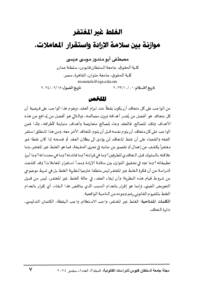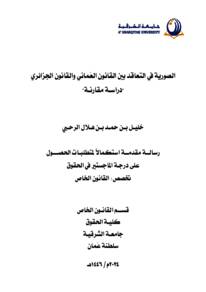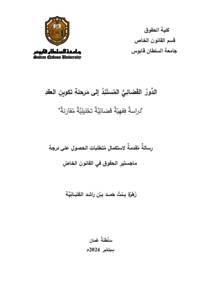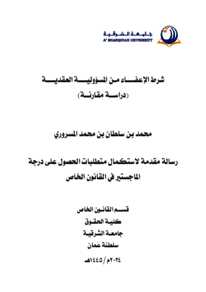Document
الغلط غير المغتفر : موازنة بين سلامة الإرادة واستقرار المعاملات.
Source
مجلة جامعة السلطان قابوس للدراسات القانونية. مج. 3، ع. 1، ص. 7-60.
Other titles
Inexcusable error : Finding a balance between sound will and the stability of transactions.
Country
عمان.
City
مسقط
Publisher
كلية الحقوق، جامعة السلطان قابوس.
Gregorian
2024-09-26
Language
Arabic
Subject
English abstract
Every contractor has a responsibility to be vigilant when finalizing a contract. This
responsibility is founded on the belief that each contractor is best placed to evaluate
their own goals and interests, and is therefore best equipped to protect and advocate
for them. The contract is a receptacle of conflicting interests and differing objectives
for its parties, so each party should hold themselves accountable before blaming the
other. In legal practice and doctrine, it has been established that a contracting party's
error will not render the contract invalid or terminated if it is an inexcusable error
resulting from negligence or a failure to investigate the truth. The study of
inexcusable error aims to clarify its definition, its connection to the pre-contractual
behavior of the parties, its evidence, benefits, limitations, prominent applications,
and its role in achieving a balance between sound will and the principle of stability
in transactions. The study finds that the concept of inexcusable error is not an
afterthought to the theory of error, but rather a crucial condition for applying this
theory. Maintaining the contract in the case of an inexcusable error is not a form of
compensation, but rather an acknowledgment of the absence of a reason to nullify
the contract, indicating the absence of legal error despite its existence in reality.
ISSN
print :2791-0938
online: 2791-0946
Arabic abstract
من الواجب على كل متعاقد أن يكون يقظًا عند إبرام العقد. ويقوم هذا الواجب على فرضية أن كل متعاقد هو أفضل من يقدّر أهدافه ويزن مصالحه. وبالتالي هو أفضل من يدافع عن هذه الأهداف وتلك المصالح. فالصفقة وعاء لمصالح متعارضة، وأهداف متباينة لأطرافها. ولذا فمن الواجب على كل متعاقد أن يلزم نفسه بألا أن يلزم المتعاقد الآخر معه. ومن هذا المنطلق استقر الفقه والقضاء على أن خطأ المتعاقد إن أدى إلى إبطال العقد أو فسخه إذا كان خطأ غير مغتفر، كأن يكون المتعاقد مهملاً أو متسرعًا أو غير قادر على التمييز أو غير مدرك لحقيقة التزاماته. فما علاقة هذا السلوك على المتعاقد للطعن في إرادته؟ وما حقيقته؟ وما قياسه؟ وما محدداته؟ وما أبرز تطبيقاته؟ وما دوره في تحقيق التوازن بين حرية الإرادة ومبدأ استقرار المعاملات؟ وقد كشفت الدراسة – وفقًا لهذه المنظومة – بأن للطعن في سلامة الإرادة بالنظر للغلط غير المغتفر، صلة بموضوع التعويض أحيانًا. وأن العقد يبطل للغلط غير المغتفر، ليس من قبيل الغلط في المحل، وإنما هو إقرار بالعدم، السبب الذي يتنافى على البقاء، أي إقرار بانعدام الغلط بالمفهوم القانوني رغم وجوده من الناحية الواقعية.
Category
Journal articles




